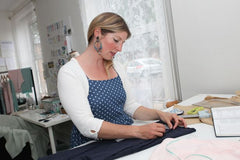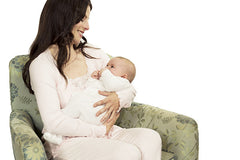-
SHOP Art
- Art Prints
-
Gift Shop
- Artist Blog
- Learn
- My Story
- Contact
- Exhibitions
-
April 15, 2015

Because we believe every little life deserves the best chance of survival, we’re offering some tips for successfully breastfeeding a preemie baby.
There are many factors which contribute to a baby being born preterm (before 37 weeks) but often the cause in unknown and more research is needed. According to the charity Bliss, as many as "15 million babies will be born prematurely around the world, 60,000 right here in the UK."
Premature babies will often be taken into neonatal care directly from birth where they will be monitored and looked after according to their needs as they continue to mature and develop. It can take weeks before some babies make it home with their parents for the first time and breastfeeding may not be possible initially.
Tommy’s charity explains that a very premature baby “will initially be fed through an IV line - a thin tube that goes directly into a vein. This carries the nutrients baby needs directly into her blood supply, so that her digestive system does not have to process them. This may last anything from a few hours after birth to days, weeks or longer, depending on how premature she is and whether she has any digestive problems”.
They explain that "even if your baby is able to digest milk, she will not be mature enough to co-ordinate sucking, swallowing and breathing until about 32-34 weeks, so until then she will need to be fed through a (nasogastric) tube" which runs from the nose (or throat) directly to their stomach, delivering your expressed breastmilk, donor breastmilk or formula milk.
Breastmilk is especially good for premature babies as it contains hormones and growth factors that helps baby grow, plus special antibodies that help their immune system and protect them from infection. It's also thought to contribute to a speedier recovery and earlier release from hospital than for those babies who don't receive breastmilk. Other supplements may also be given to your baby to help them develop and the exact care will be determined by your baby's needs and their team of carers.
Preparing to breastfeed a preterm baby:
Within 24 hours of giving birth, you will be encouraged to express your milk in order to kick start your milk production. Your breastmilk will be stored and fed to your baby via a nasogastric tube until such time as they can breastfeed. In the meantime, holding your baby skin to skin, in what’s known as kangaroo care, will build a strong attachment between you both. It also encourages your baby to move towards your breast, increasing the chance of nursing successfully when your baby is able.
It’s important to feel relaxed and comfortable when you’re expressing or breastfeeding as it is believed to help by releasing oxytocin, the hormone that stimulates milk production. If you’re expressing between feeds or haven’t yet put baby to the breast, you may wish to relax by looking at a photo of your little one and taking a moment to think about them and the love you feel for them. You may also wish to have a few creature comforts from home with you (if the hospital allows) to help you feel more ‘at home’ and less ‘clinical’ - this could just be your favourite cardigan to snuggle into that smells of your own washing powder, one of the blankets or hats that’s been used on your baby which has retained their scent or your own nursing pillow from home.
Create a quiet soothing sanctuary to express or breastfeed in at hospital (hospital setting allowing)
1. Choose a nice comfy chair in a quiet secluded spot away from draughty windows or doors. There may be a dedicated breastfeeding room within the ward for this purpose.
2. If you’re breastfeeding, keep a nursing pillow or extra cushions close by for support whilst breastfeeding.
3. If you’re expressing, ensure you have a small table next to your chair on which to place your breast pump and expressing essentials.
4. Have a handy bag or basket of essentials within easy reach which include muslin cloths, nipple cream & fresh breast pads.
5. Breastfeeding and expressing is thirsty work so have a small bottle of water to hand and some small sealed snacks for keeping up your strength.
6. Choose some form of light relaxing entertainment whilst you feed or pump, like a book, mp3 player, tablet or mobile phone.
Tips for expressing before you’re able to put baby to breast:
1. It’s recommended that you should initiate your milk production within 24 hours of giving birth by expressing their nutrient rich colustrum.
2. You should express eight to ten times a day, including at least once at night, to build up milk supply.
3. To maintain milk supply, it’s suggested that you don’t leave more than 6 hours between expressing sessions.
4. Some wards can offer a hospital grade pumping machine which can be far more effective than hand expressing or using a shop bought model.
5. Make sure you pump from both breasts to build up your milk supply.
6. The hospital staff will advise you on how and where to store your breastmilk and when they will administer it to your baby through the feeding tube.
Putting baby to breast to nurse:
When the time is right, usually after 34 weeks, baby’s sucking reflex should be mature enough to commence breastfeeding and you will be encouraged to start supplementing the tube feeding by nursing your preterm baby. This latching on guide should help you get started and your dedicated breastfeeding support counsellor will be able to check latch and positioning for you to ensure successful breastfeeding.
It’s a learning curve for both you and baby so we encourage you to remain positive whilst you overcome any nursing difficulties - especially whilst your preemie baby builds up strength to suck and feed confidently. You may find that at first, your baby may not stay on the breast for long or that he/she may only lick the nipple but it’s all valuable practice and every drop of breastmilk is considered rich nourishment. Because of this, it’s recommended that you continue to pump from both breasts after each feed to maintain good milk production and have extra stored for supplementary feeds. As baby matures and your milk supply adjusts to their demands, you will be able to stop expressing after each feed.
Whilst nothing can prepare you for the early arrival of your baby and the alien, clinical environment in which you have to spend the early days, we hope this small guide offers you a little help in giving your precious child the best start you can offer.
For further advice on premature babies, supporting charities or breast-feeding advice please click on these links: Tommy's, Bliss, Baby Center - Premature Babies, NHS
National Breastfeeding Helpline 0300 100 0212
Disclaimer: This guide is intended as a general, friendly informative guide but does not cover the full extent of issues you may face with premature birth. We're not trained medical professionals so please seek advice from your medical team, GP or breastfeeding support counsellor for medical, emotional or mental support.
September 26, 2017

August 31, 2017
We're starting a campaign which aims to inspire & empower more women to breastfeed with confidence! Supported by a monthly GIVEAWAY and Breastfeeding Cards, we want to encourage more mums to #BreastfeedWithEase #NurseInStyle
July 21, 2017

Are nursing tops important? We discuss the benefits and best buys for mums expecting to breastfeed. Nursingwear to help mums breastfeed confidently.
